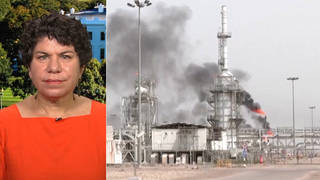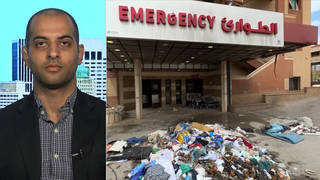
Topics
Guests
- Jon Alpertco-director of the film, along with Matthew O’Neill. He is a fifteen-time Emmy winner and the co-founder of Downtown Community Television here in the firehouse. Section 60 is his third film in a trilogy of Iraq-related HBO documentaries, following Baghdad ER and Alive Day Memories: Home from Iraq.
- Paula ZwillingerHer son, Lance Corporal Robert Mininger, was killed in Iraq on June 6, 2005.
- Patricia GenevieHer son, Private First Corporal Aaron Genevie, died April 16, 2007, in Baghdad.
The latest official count of US servicemembers who have died in the Iraq war is 4,180; in Afghanistan, 610. At Arlington National Cemetery, the nation’s preeminent military cemetery, Iraq and Afghanistan veterans are buried in Section 60. A new documentary film follows some of the families that come to visit their graves. [includes rush transcript]
Transcript
JUAN GONZALEZ: The latest official count of US servicemembers who have died in the Iraq war is 4,180; in Afghanistan, 610. At Arlington National Cemetery, the nation’s preeminent military cemetery, Iraq and Afghanistan veterans are buried in Section 60.
A new documentary film follows some of the families that come to visit their graves. It’s called Section 60: Arlington National Cemetery, airing this Monday on HBO. This is an excerpt.
AMI NEUBERGER-MILLER: I know some people have called Section 60 the saddest acre in America, because of all of the people from Iraq who are buried here, and Afghanistan, too. I would say it’s also probably one of the most honorable places in America.
AMY GOODMAN: Ami Neuberger-Miller, visiting her brother’s grave, from the film Section 60: Arlington National Cemetery.
Jon Alpert is co-director of the film, along with Matt O’Neill. He’s a fifteen-time Emmy winner and the co-founder of Downtown Community Television, here at the firehouse. Section 60 is his third film in a trilogy of Iraq-related HBO documentaries, following Baghdad ER and Alive Day Memories: Home from Iraq.
We’re also joined here in the studio by Paula Zwillinger, one of the grieving family members who appears in Section 60. Her son, Lance Corporal Robert Mininger, was killed in Fallujah, June 6, 2005.
We welcome you both to Democracy Now! Then we’re going to go to Pennsylvania to be joined by another mom. Jon, why did you do this film?
JON ALPERT: I think it’s important, if our country goes to war, that we understand who’s going to war, the sacrifices that they’re making, the honor that they’re earning for themselves, and the costs of the war. And especially in this time of, “Oh, my god! Where’s my pension going?” there is a real cost to many families for this war, and we shouldn’t forget it.
JUAN GONZALEZ: And, of course, throughout the early parts of the war, there was all of this attention to the fact that the administration tried to hide the casualties, not allow photographs of the coffins as — of the soldiers that were returning, and, in essence, sort of take those images out of the public consciousness.
JON ALPERT: Yeah, it’s really interesting. We got full cooperation from the Army to make this film. I don’t think this is something the Army itself is hiding. I think the Army wants the public to know who is paying the price for this war. We embedded, in the same way we embedded when we went to Iraq with the Army. We signed a contract, the same sort of rules of engagement, and we received full access to the cemetery.
But there certainly has been a tug o’ war over the images of this war. The coffins — the press is normally separated from what is going on in Section 60. There’s a rope line when there’s a funeral that is basically half a football field away.
AMY GOODMAN: President Bush invoked the executive order that said you can’t film, photograph, videotape the flag-draped coffins of soldiers coming home.
JON ALPERT: Well, if you would like to see, unfortunately, flag-draped coffins, they are in this documentary.
AMY GOODMAN: Jon, you filmed Paula’s son’s death in your previous film —-
JON ALPERT: Yeah.
AMY GOODMAN: —- in Baghdad ER. What did that mean to you, Paula? And talk about what this journey has meant for you.
PAULA ZWILLINGER: Well, initially, when I was notified of the film Baghdad ER, it was five months after the fact of losing my son. So, you know, you’re talking about stepping forward in the grieving process, but then, yet again, you’re having your heart ripped open again. But as a parent, you can’t turn that away, because this is an opportunity to really have any questions that you had unanswered answered at that point in time through the film, along with the fact that it’s your time to say your goodbyes. I didn’t have a chance. You know, parents, from war, in our kids’ casualties, we don’t have a chance to say our goodbyes. And that’s one of the saddest things. You know, you have this unknown, so many questions of the unknown hanging. And this was my opportunity to see that. It’s like Jon and Matt were literally able to put me at my son’s bedside, and which was a gift. It gave me a lot of questions that I had initially unanswered for months answered.
AMY GOODMAN: Like?
PAULA ZWILLINGER: And plus, the fact that I was able to say my goodbyes. So that gave me something that a lot of parents don’t have, and that’s an inner peace that — in a time of war, because I knew what would happen. I was able to really connect with the nurses and the doctor and really talk to them and the chaplain that was by his side.
JUAN GONZALEZ: And how did you then come in contact with Jon? Was this before Baghdad ER or afterwards?
PAULA ZWILLINGER: No, I first met Matt and Jon after they notified me with Baghdad ER.
JON ALPERT: She was driving back from work — I mean, ironically, as a nurse, right?
PAULA ZWILLINGER: Yeah.
JON ALPERT: And got a phone call from us, basically saying that we had seen her son’s fight for life, and we had seen him die, and gave her the details of sort of a missing gap. I mean, you knew how he was shot —-
PAULA ZWILLINGER: Mm-hmm, yeah.
JON ALPERT: —- but after that, there really wasn’t any information. And this basically filled in the last seventeen hours of his life.
PAULA ZWILLINGER: Yeah. I had a seventeen-hour black hole, I call it. And that gave me a lot of answers.
JON ALPERT: What’s interesting is that, for many families — and I don’t know, you can ask Paula — the hole in their lives, some are never filled.
PAULA ZWILLINGER: Yeah.
JON ALPERT: And this is part of the documentary. The grieving process is something that doesn’t — “Oh, you’ll get over it. You’ll get over it.” I mean, that’s what people say. They never get over it.
AMY GOODMAN: We’re joined on the telephone by Patricia Genevie. Her son, Private First Corporal Aaron Genevie, was killed April 16th, 2007 in Baghdad. I met Patty at the opening of your film, Jon, the other day. The film will actually air on HBO on Monday night.
Patty, what does Section 60 mean to you?
PATRICIA GENEVIE: It’s a sad situation to see all those graves down there and all the boys that have lost their lives to fight this war. It’s very emotional for me when I go down there. You know, I tried to put closure to my son’s death, as well as, you know, the other families that I know are going through exactly what I’m going through.
And, you know, I met Jon and Matt down there when they were doing their documentary, Section 60.
AMY GOODMAN: And in the midst of all this, we see the election taking place in the United States. What does that kind of politicking mean for you? What do you think about this war?
PATRICIA GENEVIE: I don’t think this war should have ever started, you know? But they have to win it now, you know, for the men and women that have given their lives, and the families, too, because they gave the ultimate sacrifice also.
JON ALPERT: It’s interesting. There’s a real sense of community there amongst the parents and the husbands or wives. I don’t know. Can you speak about that, Paula, and what Section 60 would mean to somebody like you and Patty, and what you find there? I know that the genesis of this film was when Sheila Nevins of HBO was calling Paula on the anniversary of her son’s death, and Paula was standing beside her son’s grave in Arlington crying. And that’s what led us to go down there. But what’s the community of Section 60 like?
PAULA ZWILLINGER: Well, you know, when people go to — normally, in a normal situation, when people go to a cemetery, they place their flowers, they spend a couple minutes, and they leave. In Section 60, it’s not like that. Literally, we are bringing — and not that you want to think it as a campout, but you’re spending hours there with your son or your daughter or your spouse, because you just have that time that you want to connect with them yet, sitting down and pulling up a chair.
And then, of course, you see the other parents or the other kinship walk by, and there’s just a connection there. You get to know them on a personal level. You get to know their kids on a personal level. You connect with them. You know just — you know, you get like a sixth sense as to who you really can really talk to, who you really can approach, who really doesn’t want to talk.
JUAN GONZALEZ: And obviously, many of the soldiers are buried at other cemeteries, but what proportion of the total is there at Section 60?
JON ALPERT: It’s one out of ten. One out of ten men and women who died in Afghanistan or Iraq are buried in Section 60. And I’ve seen Patty there many, many times. How often do you go to Section 60, Patty?
PATRICIA GENEVIE: I go down to Section 60 every two weeks.
JON ALPERT: And why?
PATRICIA GENEVIE: To spend time with my son. You know, I think that’s very important to me in my healing process, to spend as much time with him as I can. And I get to meet other Gold Star Family members that are going through the same thing that I’m going through. So they understand how I’m feeling more than just somebody, you know, else would understand, because they’re going through the same thing I’m going through.
AMY GOODMAN: I met Samara [phon.] the other night, who’s a mom who lost her boy in Iraq, and her twins are now going to Afghanistan to be part of the surge there. Jon Alpert, you are finishing this trilogy, or maybe it will go on to be a quartet — I don’t know — right? You’ve got Baghdad ER, you’ve got Alive Day Memories — Alive Day, the day when someone doesn’t die, but maybe a limb is blown off — and now you have this film, Section 60. Your feelings?
JON ALPERT: Well, I also have my plane ticket Wednesday night for Afghanistan. And we will be there at the same time that Samara’s [phon.] sons are there. In the same way that people don’t see what’s going on in Section 60, I don’t think that people have been seeing what’s going on in Afghanistan. If you ask them, “I don’t know what’s going on there. I haven’t the slightest idea.” And I think that that’s our duty and sort of our pleasure — to some degree, a perverse pleasure — as reporters, to be able to go and see these things and bring that information back. So I’m on my way to Afghanistan. That’s the —-
AMY GOODMAN: To do what?
JON ALPERT: To try and understand what’s happening there and try and help the American people understand. It’s far away. I mean, in the cacophony of the Wall Street collapse, nobody’s talking about what -— I mean, maybe your pension’s down —-
PAULA ZWILLINGER: Maybe.
JON ALPERT: —- but maybe your pension will come back. You know, her son’s never coming back.
AMY GOODMAN: I want to thank you all for being with us. Thank you so much to Paula Zwillinger for driving in for this show and being there. Patricia Genevie, thank you for talking to us from Pennsylvania. She lost her son, Private First Corporal Aaron Genevie, in 2007 in Baghdad. Paula Zwillinger lost Robert Mininger, her son, in 2005. And, Jon Alpert, thank you for all of your work. Jon Alpert, Emmy Award-winning filmmaker, headed to Afghanistan in just a few days.













Media Options